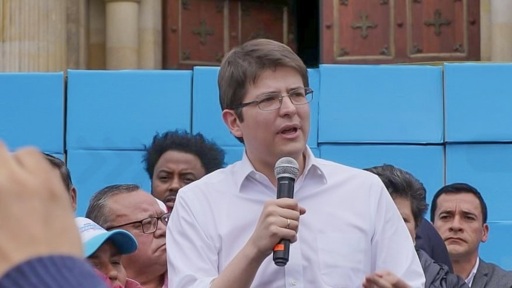Colombian senator and presidential candidate Miguel Uribe died on Monday, August 11 two months after being shot during an election campaign speech. He was hospitalized in serious condition, and had already undergone neurosurgical procedures. His death was confirmed by his wife, María Claudia Tarazona, on social media.
“Our love transcends this physical plane. Wait for me, because when I fulfill my promise to our children, I will find you and we will have our second chance,” she wrote in a post.
Last Saturday, August 9, Uribe’s condition worsened after suffering an “acute intracerebral hemorrhage.” As a result, he had to undergo another operation. During the afternoon, the Santa Fe Foundation published an update warning that the senator’s condition was “extremely critical” due to “persistent cerebral edema” and “intracerebral hemorrhage that is difficult to control.”
Two former presidents who are members of Uribe’s party mourned the senator’s death. Álvaro Uribe, leader of the Democratic Center party – who is not related to Miguel – and former president Iván Duque posted on social media protesting against what they called “Colombian criminals”.
Uribe was shot three times on June 7, twice in the head and once in the knee, while giving a speech in a neighborhood of the Colombian capital. Images posted on social media show the moment of the attack, in which the senator falls to the ground after being shot, and then appears bloodied, being rescued on a vehicle.
Shortly after the attacks, police arrested a 14-year-old boy who was identified as the shooter. The Public Prosecutor’s Office, however, is continuing its investigation and said that no hypothesis has been ruled out.
The current president, Gustavo Petro, has formed a security council to act on the case. Defense Minister Pedro Sánchez Suárez said the government is working with three possibilities for the origins of the attack against the member of the right-wing Democratic Center party.
“We could classify them into three main groups: whether it was directly because it was Miguel Uribe Turbay, or because of his connection to his political party, or whether it was an attempt to destabilize the national government through attacks on members who disagree with the current administration. This attack has an impact on the stability of our country,” he summarized.
Miguel Uribe is the grandson of Julio César Turbay, who was president of Colombia between 1978 and 1982, and journalist Diana Turbay. He graduated in law from the University of Los Andes and completed a master’s degree in public administration at Harvard. In 2012, at the age of 25, he was elected councilor of Bogotá for the Liberal Party, his grandfather’s party. At the time, he was already a vocal critic of the then mayor of Bogotá, Gustavo Petro, which helped him rise within the Colombian right wing.
Later, he served as secretary of the Bogotá government and ran for mayor of the capital, but was defeated in 2019. In 2022, he was elected senator and has also been marked in recent years as one of Petro’s main opponents in the Upper House. His main criticism was against the policy of total peace, in which the government tried to negotiate ceasefire agreements with the different armed groups within Colombia.
Uribe was a pre-candidate for the 2026 presidential elections. Uribe, who until then was not the favorite for the Executive, began to lead some polls after the attacks. The first of these after the attack, conducted by the company EcoAnalítica, indicates that the senator has 13.7% of the vote against 11.5% for Vicky D’Ávila. In third place is former senator Gustavo Bolívar, an ally of current President Gustavo Petro, with 10.5%.
Electoral violence
Attacks against politicians during campaigns are nothing new in Colombia. This is a problem that has plagued the country for decades and affects many leaders of the Colombian left. The most emblematic case was that of Jorge Eliécer Gaitán, who was shot dead in April 1948 when he was Colombia’s leading progressive leader and a potential presidential candidate.
His death put an end to an agrarian reform project and is considered one of the first sparks of what would become the civil war in Colombia, which began a few years later.
The 1980s and 1990s were also marked by escalating political tension surrounding the country’s elections. In 1989, the then Liberal Party candidate, Luis Carlos Galán, was killed by the Medellín cartel during the election campaign. He was one of the favorites in the race. Months later, other candidates were killed: Bernardo Jaramillo Ossa (Patriotic Union – UP) and Carlos Pizarro Leongómez (M-19, a former guerrilla who became a candidate), assassinated in April.
The 2022 elections, which resulted in Petro’s victory, also saw episodes of violence. According to the Peace and Reconciliation Foundation (Pares), between March 13 and May 13, 222 people were victims of electoral violence in Colombia, including 29 murders and 193 threats.
According to a survey by the Peace Development Institute (Indepaz), in the first half of 2022 alone, 42 massacres were recorded across the country, and six years after the signing of the Peace Accords, 1,624 former combatants and community leaders have been murdered.
This article was translated from an article originally published in Portuguese on Brasil de Fato.
The post Colombian presidential candidate Miguel Uribe dies two months being shot at campaign event appeared first on Peoples Dispatch.
From Peoples Dispatch via this RSS feed


